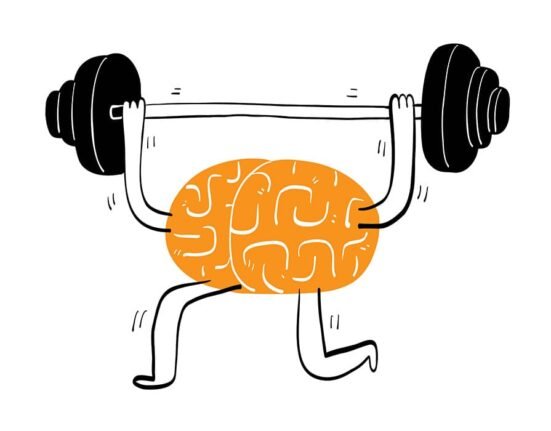The American Psychological Association defines ‘anxiety’ as a vague diffused feeling which is ‘future-oriented’ and a long-acting response to a possible ‘threat’. The emotion is characterized by feeling tension, restlessness, worrying, visible shaking, increased blood rate and palpitation. Getting occasional anxiety due to work stress, exams, financial or health concerns is normal however if the individual experiences an intense and prolonged state of anxiety it gets diagnosed as Anxiety Disorder.
Various disorders stem from anxiety like Generalised Anxiety Disorder marking prolonged and intense distress over nonspecific events or objects. Specific Phobias feature chronic and irrational fear towards specific objects such as heights or animals. Panic disorder has symptoms of a sudden attack of terror that leaves the individual with breathing difficulties and confusion. Commonly it is triggered during a frightening experience or prolonged stress but can occur without a triggering factor as well.
Causes
Various factors cause anxiety, some of which are listed below.
- Medical conditions such as coronary artery conditions, asthma and diabetes can cause anxiety symptoms. According to the CDC, prolonged anxiety can result in elevated heart rate and blood pressure, decreased blood flow to the heart, and elevated levels of cortisol, ultimately increasing the risk of heart issues.
- High-level consumption of alcohol and substance misuse can have adverse effects on health. Research suggests a strong link between alcohol and anxiety where the people suffering from anxiety disorder are more likely to have problems with drugs or alcohol at some point in their life.
- Some medications can have ugly side effects and produce symptoms that can be similar to anxiety. This includes medicine taken for thyroid and asthma (beta 2 -agonists or bronchodilators).
- Prolonged stress in daily or some particular trauma events also triggers anxiety symptoms in the individual.
- Neurobiological causes such as deficiency of or imbalance of neurotransmitters particularly, serotonin, norepinephrine and GABA.
Coping Strategies for Anxiety
Here is a list of various coping strategies and techniques that can help in coping with anxiety.
1. Analyzing the Thought Patterns
Many psychologists suggest anxiety to be a cognitive that is a mental process that starts in your mind. Unconstructive thoughts tend to fixate themselves in your mind, distorting your perception of the situation’s seriousness. One effective method to counter this is by actively questioning your fears, assessing their validity, and identifying areas where you can reclaim a sense of control over your thoughts and emotions. Unwanted settled thoughts in your mind are particularly causing the distress and should be thus eliminated. This technique of identifying these thoughts and eliminating them is called CBT.
Read More: 10 Best Therapy Dogs for Depression and Anxie
2. Practicing focused and Abdominal breathing
Breathing is very useful in calming the mind-body down. Many patients when asked to explain anxiety symptoms complain of physical pain from no particular part of the body. The agitated state of the body adversely affects the thinking capacity thus breathing exercises are useful in calming down the mind. The breathing however should be deep, focused and from the abdominal where the breath should be taken by contracting the diaphragm.
3. Daily Exercise
Physical activity triggers the release of endorphins which are the natural mood lifters thus promoting feelings of happiness and satisfaction. It often boosts the mood and calms down the mind. Research also suggests that exercise also tones down the release of stress hormones such as cortisol and adrenaline.
Read More: 10 Mood Boosters that are Absolutely Free
4. Journaling
Writing down your emotions is the first step to understanding them. Maintaining a journal about your daily activities and emotions stimulated by them can help in better understanding, differentiating and managing emotions, especially anxiety. The act in itself is therapeutic as it allows the person a safe space to explore and understand themselves and track their progress.
5. Practicing Mindfulness
Mindfulness refers to the act of being completely aware of the present and what is happening in it. Mindfulness includes techniques like meditation and grounding, where the individual gets attuned with their internal cognitive process as well as their physical sensations; this gives them clarity to respond mindfully to anxiety stimuli. This process also cultivates acceptance of self, reduces stress and improves navigation skills and emotional regulation.
6. Understanding the 5 4 3 2 1 rule
The 5 4 3 2 1 rule is an informal technique for coping with anxiety in urgent times. The rule states that when you feel anxious pay focus on your breathing and lower it then:
Acknowledge FIVE things you see around you. It could be a pencil, a spot on the ceiling, or anything in your surroundings. Acknowledge FOUR things you can touch around you. It could be your face, a bed, or the ground under your feet. Acknowledge THREE things you hear. This could be any external sound. If you can hear the rumbling of the fan on your ceiling or people talking in the other room! Focus on things you can hear outside of your body. Acknowledge TWO things you can smell. Maybe you are in the kitchen and can smell the food cooking or the spices, or maybe you are in your bedroom and smell a pillow or the scent in the room. Take a brief walk to find a scent you could smell soap in your bathroom, or nature outside. Acknowledge ONE thing you can taste. What does the inside of your mouth taste like coffee, chocolate or dinner?
7. Balanced Diet and Nutrition
Having a balanced diet with all the macro and micronutrients required for the body to properly function can significantly help in keeping up one’s total well-being. Research suggests that nutrients play a vital role in the synthesis of various important hormones and neurotransmitters that are responsible for feeling good mood and happiness. These nutrients include omega-3 fatty acids found in fish oil and chia seed, and B vitamins including B6 and B12 found in green leafy vegetables. Deficiency of this vitamin is linked to episodes of distress and anxious state.
Read more: Why Is Exercise And Good Nutrition So Important For A Healthy Brain?
8. Aromatherapy
Earlier aromatherapy was used to improve sleep and is well known for its relaxation effects. In recent times many practitioners have suggested the same could be also used for with coping anxiety. They speculate that Inhalation of certain essential oils, such as lavender, chamomile, and bergamot, has been shown to induce feelings of relaxation and reduce subjective feelings of anxiety in some individuals. These oils may act on the limbic system, the part of the brain involved in emotions and memory, to promote a sense of calmness. Aromatherapy may also enhance the body’s relaxation response by activating the parasympathetic nervous system that is involved in the digestion process.
However one must note there isn’t robust research available to fully support these claims about aromatherapy’s effectiveness in managing anxiety. While some studies suggest potential benefits, more research is needed to better understand the impact of essential oils on anxiety and mental well-being.
One must note that the above-stated techniques may or may not be useful and rather depend from one individual to another. If the individual feels an intense and prolonged state of anxiety which continuously interferes with their daily activities they must seek professional help or therapy. As it is rightly said, “ The bravest thing one can do is ask for help”.
References +
- Bourne, J.E., & Garano, L.(2003). Coping with Anxiety: Ten Simple Ways to Relieve Anxiety, Fear, and Worry. New Harbinger.
- Adeyemo D. A. (2007). Moderating influence of emotional intelligence on the link between academic self-efficacy and achievement of university students. Psychol. Dev. Soc. 19, 199–213.
- Boden M. T., Thompson R. J., Dizén M., Berenbaum H., Baker J. P. (2013). Are emotional clarity and emotion differentiation related? Cognit. Emot. 27, 961–978













Leave feedback about this